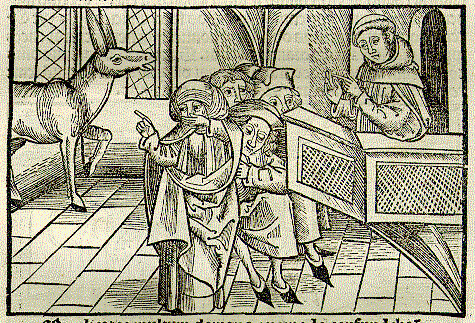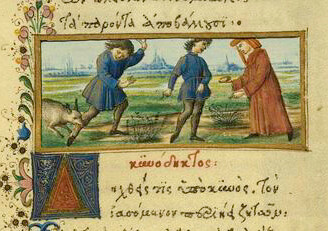HODIE: ante diem tertium Kalendas Martias.
GOOGLE BOOKS: Today's Google Books are Lubin's Florilegii diversorum epigrammatum veterum and Van Vlaenderen's Epigrammata Miscellanea.
MYTHS & LEGENDS: The art image for today's legend shows Scylla and Glaucus; you can also see the legends for the current week listed together here.

RHYMING DISTICHS: The two new Rhyming Distichs are Quid facies, facies Veneris, Quid facies, facies Veneris cum veneris ante? / Ne sedeas, sed eas, ne pereas per eas; and Tunc bene prandetur, Tunc bene prandetur, cum Christus adesse videtur: / Si des, ipse dabit, si non des, ipse negabit.
CATO'S DISTICHS: The two new Cato Distichs are Consilium arcanum, Consilium arcanum tacito committe sodali, / Corporis auxilium medico committe fideli; and Quae potus peccas, Quae potus peccas, ignoscere tu tibi noli; / Nam crimen vini nullum est, sed culpa bibentis.
MARTIAL'S DISTICHS: The two new Martial Distichs are Artis Phidiacae, Artis Phidiacae toreuma clarum / pisces aspicis: adde aquam, natabunt; and Si spumet rubra, Si spumet rubra conchis tibi pallida testa, / lautorum cenis saepe negare potes.
OWEN'S DISTICHS: The two new Owen epigrams, with Harvey's English versions, are Prophetae, Poetae, Illi de rebus praedicere vera futuris; / Hi de praeteritis dicere falsa solent; and Gerundia et Supina, Di-do-dum Aeneas aberat, caruisse gerundis / Dicitur, et nullum nosse supina virum.
CAMERARIUS'S EMBLEMS: The two new emblems are Solus Iam Grandior Errat, Turmatim iuvenes, ast gaudent aequore soli / Maiores Thunni: dic mihi utri sapiant?; and Semper Ardentius, Reginam volucrum dipsas necat; ardor amoris / Sic animum accendens te dabit exitio.
ROLLENHAGEN'S EMBLEMS: The two new emblems are Post Tentationem, Consolatio, Languescunt flores radiis solaribus usti; / Per pluvias soliti tollere sponte caput; and Sequitur Sua Poena Nocentem, Ultio certa manet; sequitur sua poena nocentem; / Ante expectatum, clauda ea viva venit.
As you can see, the image shows Ixion on his wheel of punishment:

TODAY'S MOTTOES & PROVERBS:
3-WORD MOTTOES: Today's 3-word motto is Veritas magna est (English: Truth is great).
3-WORD PROVERBS: Today's 3-word proverb is Qui quaerit, invenit (English: He who seeks, finds).
RHYMING PROVERBS: Today's proverb with rhyme is: Furtivus potus plenus dulcedine totus (English: The stolen drink is altogether full of sweetness).
VULGATE VERSES: Today's verse is Nescit homo finem suum (Ecc. 9:12). For a translation, check out the polyglot Bible, in English, Hebrew, Latin and Greek, at the Sacred Texts Archive online.
ELIZABETHAN PROVERBS: Here is today's proverb commentary, this time by Taverner: Omnes sibi melius esse malunt quam alteri: Every man loveth him self better than he loveth an other. Whether this sayeng may stand with Christes doctrine, which biddeth us love oure neighboure as our self, that let doctours and professours of divinite discusse. For some there be that put degrees of charitie, and will that charitie shoulde begin first at a mans owne selfe.
TODAY'S FABLES & STORIES:
FABULAE FACILES WIDGET: The fable from the Fabulae Faciles widget is Leo, Vacca, Capra, et Ovis, the famous story of the lion's share (this one also has a vocabulary list).
MILLE FABULAE: The "chunk" of Mille Fabulae et Una today is Fable 501, Turdi Domi Remanentes, through Fable 510, Cuculus, Luscinia, et Asinus, including Cuculus et Cantus Eius, the wonderful story of why the cuckoo goes "cuc-koo."
MILLE FABULAE WIDGET: The fable from the Mille Fabulae et Una widget is Servus Aethiops et Dominus Eius, the sad story of the slave who was scrubbed till he got sick.
AESOP IN ENGLISH VERSE: Today's fable from the English verse widget is The Woodman and the Trees, the wonderful story of the trees who were their own worst enemy.
ANECDOTE OF THE DAY: Today's anecdote is Alexander et Pirata, the wonderful anecdote of Alexander and the witty pirate: Alexander olim comprehensum piratam interrogavit quo iure maria infestaret. Ille "Eodem," inquit, "quo tu orbem terrarum. Sed quia id ego parvo navigio facio, latro vocor; tu, quia magna classe et exercitu, imperator." Alexander hominem inviolatum dimisit. Num iuste fecit?
















































